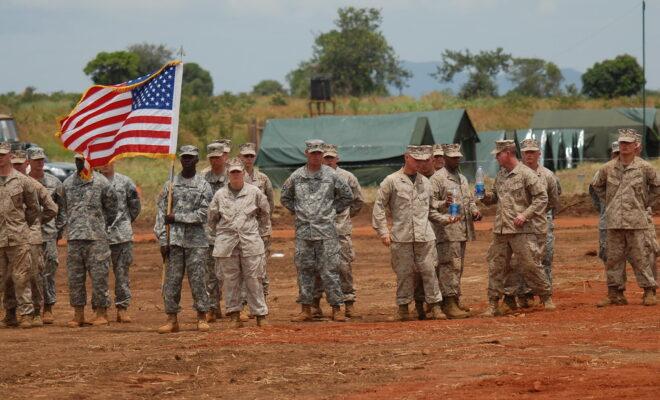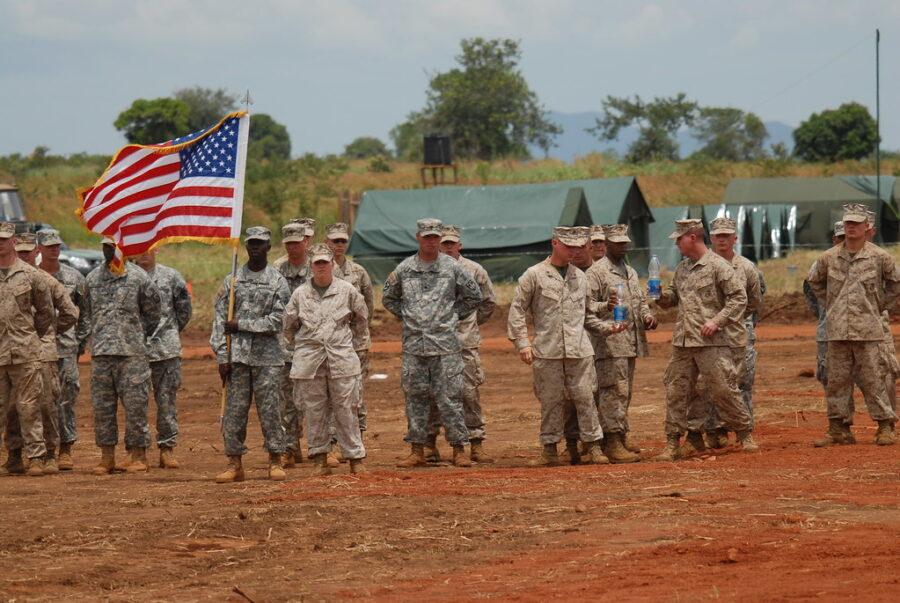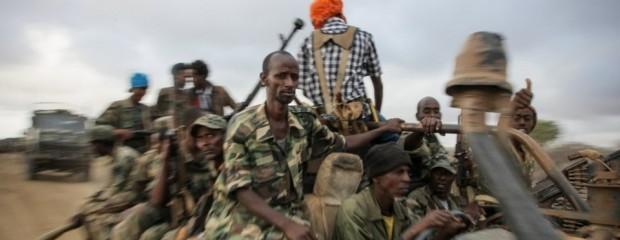The cynical realpolitik of the War on Terror: Uganda 2021 edition

The Kampala bombings will likely mean more counter-terrorism ops, more human rights abuses, and more donor support for the Museveni regime.

US soldiers training counterparts in Uganda. Credit: Spc. Jason Nolte, 21st Theater Sustainment Command.
In the last few weeks, Uganda’s capital Kampala has been shocked by several bomb attacks. The most recent came on 16 November, when a trio of suicide bombers – one outside police headquarters, two near parliament – killed four people and wounded dozens more.
The Ugandan government has blamed the Allied Democratic Forces (ADF), which the US recently designated a terrorist organisation, for the bombings. So-called Islamic State, which considers the ADF an affiliate, has claimed responsibility for some of the assaults.
This spate of attacks is devastating for residents of Kampala, but it could also have profound geopolitical consequences. It means that we will likely see a renewed stimulus to counter-terrorism activities in Uganda, which has emerged as a central partner in the “War on Terror” especially since 9/11.
This is worrying for a range of reasons.
Human rights abuses
Counter-terrorism activities under President Yoweri Museveni have a long track record of committing abuses. In the late-1990s, for instance, the ADF launched a series of bomb attacks on buses and public buildings, killing up to 88 people. The Ugandan security forces’ response was ridden with human rights violations. In their notorious “safe houses”, for instance, suspects were often arbitrarily detailed, held incommunicado, and tortured with impunity. Muslim communities were particularly targeted. Moreover, following the 2002 anti-terrorism act which contained a broad definition of “terrorism”, the state extended its crackdown to opposition members and human rights defenders. The ADF was also used as an ex post facto excuse for Uganda’s 1998 invasion of the Democratic Republic of Congo (DRC).
Today, history is repeating. In his recent address, President Museveni announced that 12 terror suspects had been killed and 106 arrested. Security forces claim the deaths occurred when suspects were resisting arrest or trying to flee, but some of these accounts are contested. In one case, for example, the suspect’s family says the man was handcuffed, led outside and shot. In another incident, eyewitness say the suspect was shot as soon as he opened the door. Some analysts have suggested that Uganda’s counter-terrorism forces are deliberately killing suspects due to pressure to deliver results. Again, many Ugandan Muslims feel they are being criminalised and marginalised. And a minister asserted last week that Uganda has the right – and is ready – to deploy in the eastern DRC, for which the Congolese government gave permission last Friday.
Making matters worse is the lack of accountability when it comes to human rights abuses. Almost exactly five years ago, for instance, security forces attacked the palace of the Obusinga Bwa Rwenzururu (OBR), the cultural institution of Uganda’s Rwenzori region, killing 155 people. Yet to this day, there has been no judicial process, form of accountability, or compensation. In fact, the commanders who led the siege have been promoted.
This was not a one-off event but rather part of a larger pattern. Ugandan security forces killed 40 people during the 2009 Kayunga riots, 9 people during the 2011 walk to work protests, and 54 people during the November 2020 demonstrations prompted by the arrest of opposition figure Bobi Wine. All followed roughly the same pattern: severe human rights abuses followed by promises of accountability – often by Museveni himself – that never materialise.
When local human rights activists or MPs do try to get justice, they are frustrated by the judicial system as the government tries to shut down legal avenues. For instance, Museveni’s administration is currently trying to change the law to stop bail for imprisoned critics, while its recent crackdown on civil society organisations – including prominent ones such as Chapter Four – has further reduced the space for accountability.
The role of international community
In this context, major questions should be asked about the role of Uganda’s international partners. Donors such as the UK and, in particular, the US have provided substantial support to Uganda’s military since the early-2000s. Both have provided trainings worth millions of dollars to military staff, while the US gave Uganda security assistance worth $104 million in 2016, $80.5 million in 2018, and $688,000 in 2020. Through budget support to the Justice, Law and Order Sector (JLOS), substantial amounts of EU and Austrian aid end up with the Ugandan police.
In the light of human rights abuses and the lack of accountability, questions should be asked about the appropriateness of this support. Yet typically, donors’ response to abuses are minimal and mirror those of the Ugandan state. Strong statements are released on the need for accountability. At times , threats to cut aid may be issued, which sometimes results in a redirecting of aid. But eventually, the issue disappears from the agenda.
Following the events of November 2020, for example, the US threatened sanctions. Despite the lack of government action, however, it only ended up imposing the weakest possible sanctions: visa restrictions against unknown individuals. On the recent one-year anniversary of the killings, donors again merely expressed their concern about the lack of accountability. This tactic is not only ineffective, but it obscures the fact that many of these same donors actively support the security forces they say need to be held to account. Recent symbolic measures – such as the non-invitation of Uganda to a democracy summit organised by US President Joe Biden – will not change this.
In the end, the international community’s actions reflect a cynical realpolitik, which calculates that the Museveni government’s allyship outweighs its disadvantages. To put it bluntly: human rights abuses, lack of accountability and corruption in Uganda are all prices that donors are willing to pay to have the Museveni regime on board as a beacon of regional stability and partner in counter-terrorism exercises. The recent attacks in Kampala may only strengthen this position by reminding donors of President Museveni’s invaluable role in their War on Terror.






